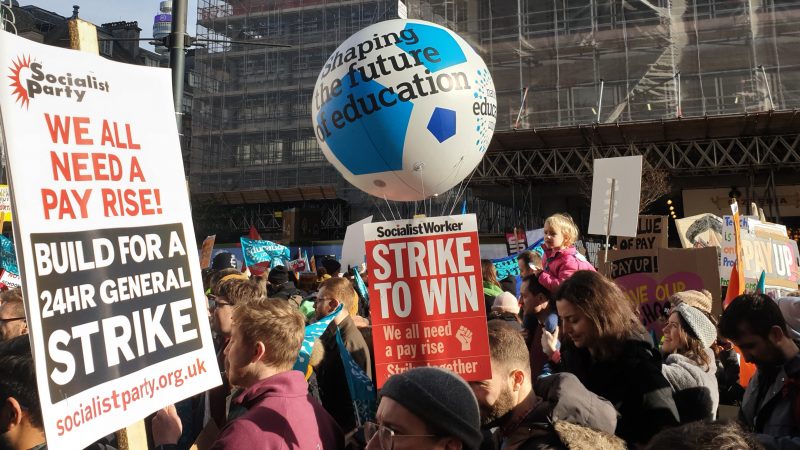Dispelling five common Tory government narratives about strikes and worker pay rises

As the government continues to condemn strike action and ministers express their ‘disappointment’ at workers choosing to exercise their basic rights to secure fair pay and conditions, we help fact-check some misleading Tory narratives around strike action.
- ‘Striking workers don’t benefit from strikes’
Penny Mordaunt told Sky News last week, “the only people that benefit from strikes are the Labour Party” and that, “it’s a myth that strikes are helpful”.
Here is a list of the recent wins this year alone from Unite the Union, the majority of which were secured directly as a result of workers taking strike action, including pay rises worth 28%.
Mostly recently London Abellio bus drivers received an 18% pay increase, which would never have been achieved had workers not kept going with their 20 days of strike action this winter.
Furthermore, the practice of withholding ones labour is not new, and has helped secure basic employment rights throughout history, including the minimum wage.
So Mordaunt’s attempt to devalue the sacrifice of striking workers serves a low blow.
2. ‘We can’t afford an inflation matching pay rise’
The government has argued that if we matched an inflation pay rise, it would add £1,000 to every household in this country.
This narrative has been spread by multiple Tory ministers who have suggested it would cost £28 billion to give public sector workers a pay rise.
Lawyer Peter Stefanovic has called this, ‘economically illiterate and economically untrue’ whilst the Institute for Fiscal Studies said these sums simply ‘don’t add up’.
This argument was used by the Health Minister to undermine nurses pay, when she said it would cost the government £700 million for every 1% pay increase given to nurses.
The BBC’s head of statistics said this number ‘simply doesn’t apply’ unless used for a much larger pool of people, including all non-medical staff such as porters, ambulance staff, administrators and senior figures, not just nurses.
Therefore, the figures are rendered irrelevant.
3. ‘Independent’ Pay Review Bodies
The government has sought to shirk responsibility for workers’ demanding better pay by hiding behind Pay Review Bodies.
They are continually used to justify the government’s refusal to increase pay offers to public sector workers and render union’s pay demands as ‘unaffordable’, allowing strikes to continue.
However, the RCN has said there is ‘nothing independent about them’ whilst Paul Nowak, General Secretary of the TUC, accused the government of using them as ‘a human shield’.
Government departments are themselves responsible for appointing members in PRBs, who are experts and economists within the public and private sector.
The remit of these ‘independent’ bodies is set out by the government, so any recommendations made are constrained by the amount of money on offer, which is pre-determined by ministers.
This means any recommendations are already constrained by the financial red-tape laid out by the government.
The government has also ignored the pay review bodies in the past, as their recommendations are not legally binding, undermining the government’s inflexibility over their refuse to budge on pay.
The Financial Times recently cited that public sector unions have lost trust in the independence of pay review bodies, questioning if they are still fit for purpose.
4. ‘The UK must be brought in-line with European strike laws’
European trade unions have come out to condemn the UK government’s claims that new strike legislation is necessary to bring the country in-line with European strike laws.
Ministers have continued to parrot that European countries already have minimum safety levels, as an argument to push through their Minimum Service Levels (MSL) Bill.
However, unions representing over 20 million workers have come out to strongly dispute these claims.
For example in Italy, a worker who refuses to attend work under the terms of an MSL cannot be threatened with the sack, which is what the UK’s anti-strike legislation would enable.
In France, collective bargaining coverage is much more widespread. Over 95% of employees are covered by collective bargaining agreements and there is no obligation to inform the employer or seek to conclude an agreement before strike action in the private sector.
In the public sector, you have to give 5 days’ notice (compare to two weeks in the UK).
Whilst in Spain, social dialogue with trade unions is enshrined in the constitution.
5. ‘Minimum safety levels not being met during strike action’
The government has continued to claim that strike action poses a threat to public safety, another argument they are peddling to get through the anti-strike legislation.
Claims by Grant Shapps that ambulance workers were not meeting minimum service levels on their strike days were called both ‘worrying’ and ‘seriously misleading’ by Unite the Union’s Head of Constitutional Affairs, Hannah Reed.
Ambulance trusts have continued to draw up emergency cover provisions with unions ahead of strikes to ensure operational needs are met on strike days.
Furthermore, health workers have said they are striking in direct response to their inability to currently ensure minimum safety levels in their profession, due to severe funding cuts and staff shortages – rendering this claim by the government ironic at best and dangerous at worst.
Hannah Davenport is trade union reporter at Left Foot Forward
Left Foot Forward’s trade union reporting is supported by the Barry Amiel and Norman Melburn Trust

Left Foot Forward doesn't have the backing of big business or billionaires. We rely on the kind and generous support of ordinary people like you.
You can support hard-hitting journalism that holds the right to account, provides a forum for debate among progressives, and covers the stories the rest of the media ignore. Donate today.



